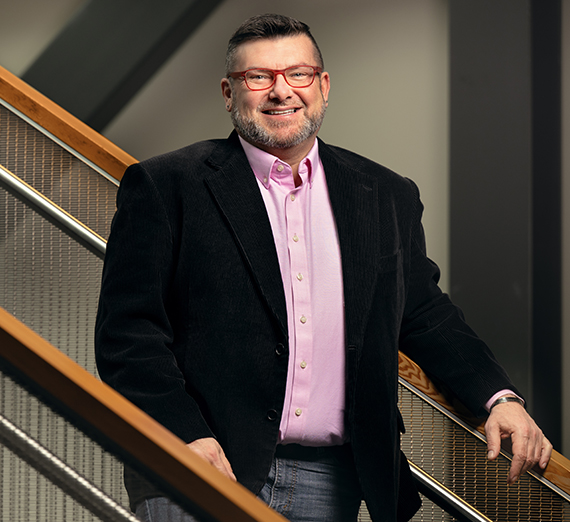Haddock Brings Wealth of Experience to the Lincoln LGBTQ+ Resource Center

Brandon Haddock is a long way from home. The second-ever director of the Lincoln LGBTQ+ Resource Center packed up and moved to Spokane in September after growing up in the Missouri Ozarks and spending most of their adult life in the Midwest. There are a few key differences – the lack of tornado sirens being a major one, Haddock jokes – but across hundreds of miles and several state lines, their mission remains the same.
“It’s always been very important to me to be able to give people a voice.”
Haddock earned their bachelor’s degree in geography, geology and planning, and their master’s at Missouri State University, then went on to earn a doctorate in geosciences from Kansas State University (KSU). Even if earth science didn’t seem like a clear path to helping others, that was always a driving force for Haddock. Their first week on campus as an undergraduate, Haddock volunteered with the AIDS Project of the Ozarks, carrying out HIV testing and delivering food to people who needed it. Haddock leaned on their education to connect with their indigenous roots and support historically erased and underrepresented communities. It eventually led them to a job in higher education as the inaugural coordinator of the LGBTQ+ support center at KSU, where they stayed for more than a decade.
“I’ve had a lot of experiences,” Haddock says. “I’ve had great experiences, bad experiences,” and everything in between, including a complicated relationship with higher education. But it’s the collection of those experiences that led them to Gonzaga, straight to a role meant to serve and affirm students.
“I don’t want students to have to go through what I went through,” Haddock says, describing struggles with financial aid, navigating housing and discrimination. Haddock knows they are here to share in students’ troubles and be the support system they need. “I want students that are having a similar experience to what I went through, or that have similar identities to me, to know that somebody is there for them.”
Haddock also believes their role goes beyond that. The Lincoln Center is widely regarded as a “safe space” for LGBTQ+ students to exist in community on campus. Haddock believes there are no “safe spaces,” not really. But, they say, “it’s an open and affirming space, a space for individuals to be themselves away from the day-to-day.” It’s a place for students to come between classes, to relax or to eat lunch. “Between Matthew and I, there is a lot of lived experience,” Haddock says (Matthew Barcus is the program manager for LGBTQ+ education and support). “We can help people navigate whatever they're going through,” and provide them with a space to do it, too.
The center and the support that comes with it extend to faculty and staff as well, Haddock says. “There is a lot that we, as adults, neglect to acknowledge,” they say. “We have this idea that bullying or social problems stop when you grow up, but they don’t necessarily.” Haddock wants the people at Gonzaga that support students to know they are supported, as well.
A lot of this work existed at the Lincoln Center before Haddock even arrived. They hope to continue the good things they’ve got going, “but also to re-imagine some of those things.”
AdventureOUT is a program implemented by Haddock that focuses on physical wellness – getting people outside, in nature, through short lunchtime walks and weekend hikes. So far, Haddock has partnered with GU Outdoors for multiple outdoor events including a snowshoeing trip to Mount Spokane, and they hope to bring a foraging hike to the center soon.
Growing Wellness, another new program, is Haddock’s metaphorical baby. They started the program at KSU in 2019, giving about 20 students a plant to nurture then planning events, check-ins and trainings to go along with the growing process.
“There’s a lot of research that shows having a living, green thing around you and in your living environment helps your mental health,” they say. “The routine of watering and taking care of something helps students better understand how to care for themselves.”
By the time Haddock left for Gonzaga, the program had grown (no pun intended) to more than 120 people. They’re hoping for the same kind of success this time around.
There’s important work being done in the Lincoln Center, and Haddock wants the faculty, staff and students to know, just as the space can be enjoyed by all, that work isn’t meant to be carried by the LGBTQ+ community alone.
Referencing a quote from Bayard Rustin, a political activist and gay civil rights leader, Haddock invites us all to “be angelic troublemakers.”
“I truly feel like right now is the time and place to do that,” they say. “We have to stand up for our kin, our brothers and our sisters, our cousins and everyone we are in community with. We need to be making sure that our voices are heard, and for those who can’t, we need to use our privilege to heighten their voices.”

